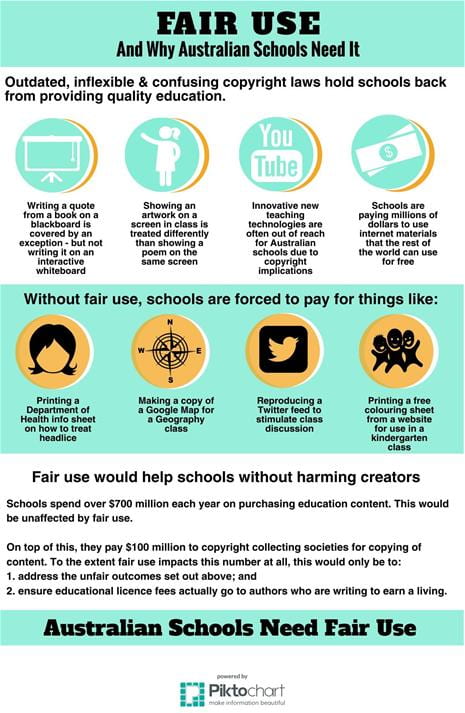[Reflections of ETL503 Module 4 Legal and Ethical Issues of Collections]
Thoughts that occurred to me while reading about Copyright laws, the SmartCopying assistance website and Creative Commons:
- The NSW Department of Education (DET) are said to ‘own’ the ‘intellectual property rights’ to my yearly teaching and learning program documents, which I have created either: at home or at school or at a training facility and either: off my own back or because of training the DET have provided for me. We must also attribute or reference items that we get from our schools (or the DET) or items ‘created as part of your duties’ because this applies to the Crown Copyright laws. But does this mean that the ‘crown’ own the material and that we must therefore leave a copy of our programs at the schools in which we’re employed (by the crown)? In my LGA, schools have interpreted these laws to mean that they must collect a printed version of my yearly teaching and learning program and store it on sight, because – in the view of the executives of the LGA schools – the DET ‘own’ the rights to the contents of my program. Do they really? Did I sign something giving over my copyright protection when I joined the DET as an employee? Are the executives in my LGA misinterpreting the DET’s policy on Copyright and infringing on my rights as the author of the program? Where then does this impact on me when I do my program completely electronically on the cloud, e.g. do the executives have the right to force me to print it or share it permanently with them electronically, so that they can store a copy indefinitely? Doesn’t this bring into issue the rule that copies of resources in my program cannot be stored indefinitely? This is, on the whole, a problematic policy…to which, I simply reply: “no. “
- While copyright infringement is obviously hard to police in the classroom, it can be easily monitored by online applications that search things like library catalogues for ‘pirated’ material. So, it might not be a good idea for schools to hoard digital/cloud collections of teacher’s work or programs, which might have been pirated?
- Programming is also becoming very collaborative. Some teams of teachers even share their program freely to the public on the Internet or on social networking platforms such as the string of FaceBook groups: ‘On Butterfly Wings English’ / Mathematics / Science / Creative Arts / etc. I understand that the work must be co-referenced if it was created collaboratively. However, if work is shared to the greater teaching community for use educationally, how is this to be referenced or does it have to be referenced according to Copyright law? Is it even legal to share it so broadly given that the employer presumably ‘owns’ the rights to the work?
- Teachers are not meant to be profiting from the work that they’ve created while employed with the DET. This is meant to stop teachers from ‘selling’ their programs or resources that they’ve either created or obtained for profit, as they ‘belong’ to the DET. Is this because of the Statutory Text and Artistic Licence Permit that the DET holds as teachers selling possibly copyrighted materials would null the DET’s yearly permit?
- Regarding the music that schools in my LGA generally upload from iTunes or YouTube for end of year concerts…these events are open to the public and as a performance of the music to the public, should we make sure we have Copyright permission – or is this covered by the Statutory Licenses? When I checked the DET website, I am still unclear if the yearly licences for playing films, TV or radio for non-educational purposes are paid for by the DET or the schools themselves.
- Is the Australian Copyright law’s lack of a requirement to register copyright and lack of requirement to list the copyright on a piece of work, the reason why copyright infringement is rife in Australian society? Would it be more rife if the laws were more strict? Who has more copyright infringement, the USA or Australia? How would we ever be able to research this and really know when it is usually an underground / blackmarket issue?
- Is lack of transparency or knowledge regarding the special licenses granted to schools enabling schools to teach students (inadvertently) that they, by default, don’t have to worry about Copyright?
- If all websites need to be accessible by people who have disabilities, (Flynn 2016) shouldn’t alternate modes of communication be mandatory based on the needs of the people in every school context? What about ‘bridging the gap’ for ATSI communities? How effective is a school with an entirely digital form of communication, when the majority of the community are illiterate or too poverty stricken to afford access to a computer or internet facilities? I am keen for Australia to take the lead in website accessibility as a social justice issue rather than waiting for Americans to pull their fingers out and make a change. An American by birth myself, I am horrified that their greatest solution to the injustice is to teach their students with disabilities to be advocates for change for themselves. While I appreciate that students should be taught to self-advocate, this is a bit of a ‘flick pass’ on behalf of educators who should be advocates for their students as well (IFLA 2012).
- This is a great PowerPoint for schools to use to help educate students (and teachers) on the use of Creative Commons: Creative Commons in the the classroom.
- Some important links that all TL need to keep bookmarked from SmartCopying.com (National Copyright Unit n.d.):
- ‘Educational Licences in Schools and TAFE’;
- Text Works & Fair Dealing/& ‘reasonable portion;
- ‘Playing Films, Television and Radio in Schools’/Film, Video/DVD /‘Playing films for non-educational purposes‘;
- Internet and Websites;
- Performing and Communicating Music in Schools;
- Copyright Implications of Content Management Systems: Schools;
- Assisting children with disabilities
References
Coates, J. (2013). Creative Commons in the the classroom. [slideshare]. Retrieved from http://www.slideshare.net/Jessicacoates/creative-commons-in-the-classroom-2013
Flynn, N. (2016, December 16). Australian web accessibility laws and policies. cielo 24. Retrieved from https://cielo24.com/2016/12/australian-web-accessibility-laws-and-policies/
Gibbs, J. (2014, January 26). 1. How copyright works [Video file]. Retrieved from https://youtu.be/WWIV8ZmFhvM
International Federation of Library Associations. (2012). IFLA code of ethics for librarians and other information workers. Retrieved from http://www.ifla.org/files/assets/faife/publications/IFLA%20Code%20of%20Ethics%20-%20Long_0.pdf
Palmer, Z. B., & Palmer, R. H. (2018). Legal and ethical implications of website accessibility. Business and Professional Communication Quarterly, 81(4), 399-420. Retrieved from https://journals-sagepub-com.ezproxy.csu.edu.au/doi/pdf/10.1177/2329490618802418
National Copyright Unit. (n.d.). Smartcopying. Retrieved from http://www.smartcopying.edu.au/

